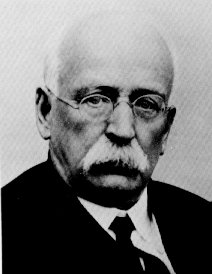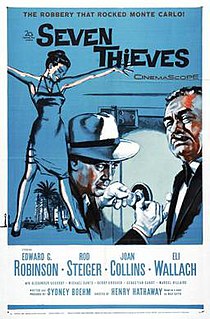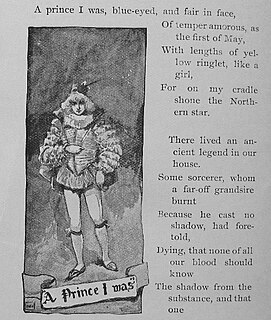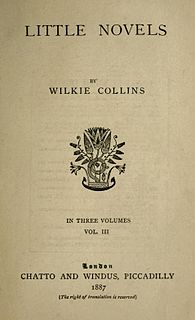
Sir Ebenezer Howard, the English founder of the garden city movement, is known for his publication To-Morrow: A Peaceful Path to Real Reform (1898), the description of a utopian city in which people live harmoniously together with nature. The publication resulted in the founding of the garden city movement, and the building of the first garden city, Letchworth Garden City, commenced in 1903.

The Dybbuk, or Between Two Worlds is a play by S. Ansky, authored between 1913 and 1916. It was originally written in Russian and later translated into Yiddish by Ansky himself. The Dybbuk had its world premiere in that language, performed by the Vilna Troupe at Warsaw in 1920. A Hebrew version was prepared by Hayim Nahman Bialik and staged in Moscow at Habima Theater in 1922.
Jaufre is the only surviving Arthurian romance written in Occitan. A verse romance approximately 11,000 lines long, its main character is equivalent to Sir Griflet son of Do, a Knight of the Round Table known from other literature. Translations of Jaufre were popular on the Iberian peninsula; a version of the tale even exists in Tagalog, the language of the Philippines.

Seven Thieves is a 1960 20th Century Fox film noir crime drama motion picture shot in CinemaScope. It stars Edward G. Robinson, Rod Steiger, Joan Collins and Eli Wallach.

The Law and the Lady is a detective story, published in 1875 by Wilkie Collins. It is not quite as sensational in style as The Moonstone and The Woman in White.

Crimes at the Dark House is a (1940) British film directed by George King starring Tod Slaughter, Sylvia Marriott and Hilary Eaves. It is loosely based on the novel The Woman in White by Wilkie Collins.

The Frozen Deep is an 1856 play, originally staged as an amateur theatrical, written by Wilkie Collins under the substantial guidance of Charles Dickens. Dickens's hand was so prominent – beside acting in the play for several performances, he added a preface, altered lines, and attended to most of the props and sets – that the principal edition of the play is entitled "Under the Management of Charles Dickens". John C. Eckel wrote: "As usual with a play which passed into rehearsal under Dickens' auspices it came out improved. This was the case with The Frozen Deep. The changes were so numerous that the drama almost may be ascribed to Dickens". Dickens himself took the part of Richard Wardour and was stage-manager during its modest original staging in Dickens's home Tavistock House. The play, however, grew in influence through a series of outside performances, including one before Queen Victoria at the Royal Gallery of Illustration, and a three-performance run at the Manchester Free Trade Hall for the benefit of the Douglas Jerrold Fund to benefit the widow of Dickens's old friend, Douglas Jerrold. There, night after night, everyone – including, by some accounts, the carpenters and the stage-hands – was moved to tears by the play. It also brought Dickens together with Ellen Ternan, an actress he hired to play one of the parts, and for whom he would later leave his wife Catherine. The play remained unpublished until a private printing appeared sometime in 1866.

The Princess is a serio-comic blank verse narrative poem, written by Alfred Tennyson, published in 1847. Tennyson was Poet Laureate of the United Kingdom from 1850 to 1892 and remains one of the most popular English poets.

Poor Miss Finch (1872) by Wilkie Collins is a novel about a young blind woman who temporarily regains her sight while finding herself in a romantic triangle with two brothers.
Tilly of Bloomsbury is a 1940 British comedy film directed by Leslie S. Hiscot and starring Sydney Howard, Jean Gillie, Kathleen Harrison and Henry Oscar. It was based on the play Tilly of Bloomsbury by Ian Hay. The screenplay concerns a young woman who falls in love with an aristocrat, and attempts to convince his family that she is of their social class.

Rachel Chiesley, usually known as Lady Grange (1679–1745), was the wife of Lord Grange, a Scottish lawyer with Jacobite sympathies. After 25 years of marriage and nine children, the Granges separated acrimoniously. When Lady Grange produced letters that she claimed were evidence of his treasonable plottings against the Hanoverian government in London, her husband had her kidnapped in 1732. She was incarcerated in various remote locations on the western seaboard of Scotland, including the Monach Isles, Skye and St Kilda.

The Black Tulip is a French-Italian-Spanish film which reused some names in the novel of the same title by Alexandre Dumas but its story does not follow the novel. It is, essentially, a star vehicle for the popular French actor Alain Delon.
The Great Impersonation is a 1942 American thriller film directed by John Rawlins and starring Ralph Bellamy, Evelyn Ankers and Aubrey Mather. It is an adaptation of the 1920 novel The Great Impersonation by Edward Phillips Oppenheim with the setting moved from the early 1910s of the novel to the Second World War. It was made by Universal Pictures and was a remake of their 1935 film of the same name. German intelligence believe they have planted an agent inside the British establishment by murdering British aristocrat Sir Edward Dominey in Africa and replacing him with his doppelganger. However, over time, they begin to have doubts about just what happened in Africa and as to whether the man claiming to be Dominey is really an imposter.

Who Killed Zebedee? is a short detective story by Wilkie Collins, first published under the alternate title "The Policeman & The Cook" in serial form in 1881. A young wife is convinced that, while sleepwalking, she has murdered her own husband, John Zebedee. Together, a young constable and the cook from the couple's final lodgings attempt to uncover the truth.

This is a bibliography of the works of Wilkie Collins.
The Dead Secret was Wilkie Collins’ fourth published novel.
"A Terribly Strange Bed" is a short story by Wilkie Collins, first published in 1852 in Household Words, a magazine edited by Charles Dickens.

Creatures of Circumstance is a collection of 15 short stories by the British writer W. Somerset Maugham, first published by William Heinemann in 1947. It was the last collection of stories prepared by the writer.
















